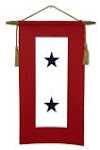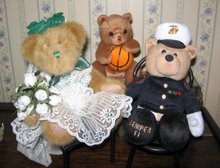President Bush and the Virtue of Loyalty
On Saturday, August 20 CNBC’s Tim Russert hosted an hour-long interview with David McCullough, author of 1776, a history of America’s most formative year (which sits languishing on my bookshelf waiting to be read). There are lots of messages in the study of our own nation-building, and McCullough is very clear about the big ones.
1) Historical ignorance among Americans, especially the young, is rampant and dangerous and tragic, and made itself particularly evident in the nation’s reaction to September 11. It was probably America’s single darkest day, says McCullough, but by no means did it plunge us into America’s darkest period—that happened in 1776 and the years following, in which we slogged through a Revolution against a vastly superior military power in a largely unpopular war run by people with no military experience whatsoever.
There are many reasons why the “American cause” (which was not independence initially, but simply a sense that there was an extraordinary venture in danger of being squandered) eventually triumphed—some of them had to do with the character of great leaders, and followers, but many of them can only be put down to divine Providence. (A couple of centuries’ perspective makes us feel safe in saying that—we should probably not jump on it too quickly as being the guiding force behind any current administration.)
2) One of the major reasons that the American Revolution succeeded is simply because the people who fought it were tough. Life was tough. According to McCullough, residents of the American colonies probably had the highest standard of living in the entire world at that time (as was recognized by the British soldiers landing there, confirming for them that these upstart colonists were totally out of line in complaining about their treatment). But it was still one damned exhausting way to live day to day.
There were no simpering wimps among the ranks. They could put up with hauling and grinding and shivering in the cold or sweating in the heat (still keeping their waistcoats and petticoats on, as propriety demanded). They walked miles without thinking about it, spun their cloth if they couldn’t afford the imported stuff, made their own candles and collected the stubs to be recycled, lived with the smell of garbage and sewage that would knock us all dead. And they buried their dead, regularly, in coffins sized from six feet to one foot long, year in and year out as a matter of course, when the remedies ran out for coughs, fevers, headaches, and ill-mended bones. When it came time to form an army, and to form a plan of battle, leaders rose to the occasion equipped with nothing more than a cause and a vision, and enough honor to persevere under the worst conditions and criticism.
Asked to name his favorite from among the cast of “characters” of the events of 1776, David McCullough unhesitatingly chose Nathanael Greene of Rhode Island. He was probably Washington’s most trusted general, who kept his command despite one disastrous decision which brought about the surrender of two forts. Washington recognized Greene as a gifted strategist in “unconventional” (guerrilla) warfare, and did not let one bad judgment cost Greene his commander’s confidence and loyalty.
This characterization of the relationship between Washington and Greene made me think immediately of one common perception of the workings of the Bush administration. It is often said that the one thing President Bush has always valued above all others in the conduct of his political life is loyalty—he expects it of his associates, and they can expect it to be reciprocated by their candidate/boss.
This is a quality which is of particular importance with regards to two of Bush’s most powerful “operatives,” Donald Rumsfeld and Karl Rove. The two have certain personality traits in common which are of boundless irritation to their opponents, among which are an apparent insouciance and unflappability. Rove has more behind-the-scenes inscrutability—Rumsfeld faces down his critics (especially those in the press, but also many a grandstanding senator on the Armed Services committees) with a dry, cool, folksy rhetorical style which can deliver up refreshingly blunt facts or deceptively terse obfuscations without breaking a sweat. Both of these guys drive the political left nuts, and Bush seems to love them for it.
Karl Rove, evil genius and sorcerer, has the non-specific title of the President’s top “political advisor.” It’s not really a government job, though all politicians have one, and are free to decide the qualifications for the position. If Rove were capable of achieving 10% of what his enemies attribute to his machinations, he would have to be getting help from either a monumental Satanic power (which most of his enemies don’t actually believe in) or a conspiracy of collaborators so vast that Bush’s 2004 election victory should have been by a margin comparable to that of the average dictator running unopposed (like Saddam Hussein’s regular 99.5% endorsements). For such a powerful political genius, Rove’s capture of a 3% margin for Bush in ’04 has always struck me as extremely unimpressive.
There’s no question than Rove’s strategy to mobilize volunteers for personal door-to-door campaigning was both salutary and effective. (There are those who think he simply borrowed standard operating procedure for political campaigning in parliamentary democracies like Canada—no genius involved, just use of a time-honoured technique which consistently yields better voter turnout than in the United States.) But beyond the effectiveness of his on-the-ground strategy, I wonder how Rove accounts for a mere 3% victory over an opponent who may have been the weakest and most unappealing candidate the Democratic Party has put forward in at least a century.
The plank-stiff and memory-challenged Al Gore made Bill Clinton look like a beacon of sincerity and statesmanship (quite an achievement, Mr. Vice-President!). But John Kerry—arrogant, elitist, politically undistinguished, permanently tainted by his vile and thoroughly dishonest performance as the principal voice of Vietnam Veterans Against the War in the 1970’s, and an embarrassingly obvious weather-vane candidate whose political stands whirled from one extreme to the other with every breeze exhaled by his party pollsters—made even Al Gore look stable and reliable by comparison. (At least until Gore emerged from his bearded, earth-toned professorial retirement to revive the war-cry that he was robbed in 2000—then he began to look hugely unstable, but was a marginal force, if not kiss of death, during the ’04 campaign.)
On the morning after the ’04 election, standing in Washington D.C.’s Reagan building inner court, President Bush referred to Karl Rove, with a kind of breathless awe, as “the architect.” If Rove was the architect of a campaign which allowed the opposition to frame the war on terrorism as a dishonest and misdirected “quagmire,” without bothering to brief his candidate on how to pound that characterization into dust by recounting, in detail, the sacrifice and honourable accomplishments of the troops in the field, then please let us call in the structural engineer—we need to know if this architect is capable of constructing anything we can rely on.
If Rove didn’t understand how much the American people WANTED to back this President and his offensive against terrorism, and how much they were CRAVING a chance to celebrate its successes, and make personal sacrifices for its future— (and there is no evidence from the campaign that anyone involved understood these things)— where’s the genius? I don’t see it. Bush should have beaten his hapless opponent by five to ten percentage points, at a minimum. But he never did, and still does not, deliver the message that Americans not only want to hear, but are hearing and reading from the sources that have shattered the mainstream media cone of silence, sources they now find more reliable and informative than the government they re-elected: that most of Iraq is peaceful, and that where violence continues, the war CAN be won if we don’t hold back and (as Mrs. Thatcher so aptly put it) “go all wobbly.”
The President’s consistent resort to bromides and vagaries (see my post on Cindy Sheehan) simply says to me that if Rove is his top political advisor, Rove gives lousy advice. I am grateful that John Kerry was not allowed anywhere near the chair of Commander-in-Chief, but I would have preferred to have reached that goal without all the sweating and moaning so many of us did all throughout campaign, as Bush missed almost every opportunity to make his case convincingly as to why he was on the right track. I’m pretty sure (with all due modesty) that if I’d been writing his speeches, the margin of victory would have doubled. (To anyone who doubts that, I’m for hire any time.)
But at the end of the day (November 2, 2004) Bush won, and if he thinks Rove did a great job, fine and dandy—give him a bonus and renew his contract. As for his White House team-mate, Donald Rumsfeld, underperformance is a more serious matter. Rumsfeld himself said it (although in a rather drybones comparison between non-equivalent enterprises): just like when he was in the pharmaceutical industry— when he makes a mistake, people die.
During the election campaign of 2004, I tried to assuage my frustration with the Republicans’ customary ineptitude by digging up email addresses for people I knew were involved directly in the national campaign, or who had the ear of somebody in the White House. I’d heard Ed Gillespie speak in Washington and had his business card; I hunted down Mary Matalin once she came out of retirement and became an advisor. And I scrounged addresses for a few other journalist and staffer-types, and began flinging emails toward them, and anyone else who would listen.
The gist of my letters usually came down to the same thing (once again, see my post on Cindy Sheehan.) , i.e., that the President was failing in his duty to tell the American public about the heroes of Iraq—the decorated soldiers, sailors, airmen, and Marines (not just dead ones but survivors too) who were giving of themselves in the cause of historic change in the Middle East, for the Iraqis immediately, but for the whole region in the long term. The situation a year ago was not nearly as grim as it looks today, but you would never know that from the way the President and his campaign organization often ceded to the opposition virtual control over the message.
Nevertheless, I was convinced that from the get-go the action in Iraq was not progressing as it should have, due in large part to its use as an arena for the playing out of Donald Rumsfeld’s theories about reforming the United States military. Over time such progress as was being made was certainly blacked out by an unsupportive press. But to anyone who was paying attention it was clear that the mainstream press was daily losing ground in its ability to manage public perceptions-- millions of Americans were getting the news, for better or for worse, which they couldn't get from the administration or the press.
[And let's just bust one little myth here, specifically the popular idea, common especially in Europe, that the press was in the pocket of the administration during the invasion of Iraq. This is a complete misunderstanding of the situation. The embedding of reporters with active units was a very effective way of bringing the reality of war directly to the folks at home, even as it robbed the reporters of their self-appointed role as armchair quarterbacks-- which is, I'm sure, exactly what DoD had in mind by placing them there. If most of the embeds appeared thrilled and impressed by the view from within, it is not because they were mindlessly pro-American or shilling for the administration-- it's because (a) they were actually seeing the truth about the skill and dedication of the American soldier, of which they otherwise knew nothing, and (b) when push comes to shove, most journalists are mindlessly pro-themselves. They believe they are more perceptive, intelligent, and courageous than most ordinary people, and they will naturally respond favourably to conditions that fulfill their image of themselves.]
Still, progress was halting, politics was interfering in the prosecution of the war and the peace (in ways we had thought would never happen again after the disastrous example of politicized defense policy in Vietnam—but then we saw the pull-back in Fallujah and it was deja-vuja all over again), and certain things were becoming patently obvious: there were not enough troops on the ground, and the wrong kind of troops were being deployed in the most dangerous places.
The buck, for all of these problems, stopped at Mr. Rumsfeld’s stand-up desk—it still does. In 2004 I was writing to my involuntary correspondents that if voters could mark their ballots to read “Bush but not Rumsfeld,” the President would get more votes than he would on his name alone, and I am still convinced of that. I suggested that a cabinet-shuffle would be in order, some of it announced prior to the election, and that Rumsfeld still might be usable in a newly created post overseeing weapons R & D (for he is truly correct that these areas always lag behind in every conflict), but that someone with a better sense of the new realities of soldier-to-civilian relations, which are personnel heavy and to a great extent non-military, should be in charge of the transformation of Iraq. Colin Powell’s concepts of “overwhelming force” were borderline absurd in the first Gulf War, and even then were under-used (allowing Saddam to reign on and compound his atrocities). But Rumsfeld’s “underwhelming force” was/is costing lives and prolonging the inevitable disorder. It’s long past time for him to go.
When President Bush stood on the smoldering pile of the World Trade Center with a bull-horn, and roused the exhausted emergency workers, as well as the shell-shocked American public, with the cry that the perpetrators of this atrocity would soon "hear from all of us," he was the perfect man for the job. He was Everyman, the kind of ordinary citizen whose heart and determination were in exactly the right place when the call for revolution came in 1776. But it has become clear in the interim that he does not have the discernment of character, the richness of culture, or the personal toughness that would have put him in the saddle of George Washington, citizen general, or even at Washington's flank like Nathaneal Greene. It may be that standing on the debris pile in New York was the premier moment of George W. Bush's Presidency, and he has been to some degree struggling to find his footing ever since.
Mr. Bush’s recognizes loyalty as a virtue, and that’s a good thing. But I fear that he mistakenly identifies loyalty to himself as the virtue’s highest form within the arena of politics. He needs to be reminded that he has a higher loyalty than to his friends, colleagues, supporters, advisors, and staff. His first loyalty, politically, is to the American people, with a special regard for those who have shown their own loyalty by putting on the uniform. Removing talented people from positions where they are no longer effective is not even an act of personal disloyalty, much less a violation of the larger ideal—it is a simple matter of realism, honesty, and workplace efficiency. It is a question of the higher loyalty which should direct all decisions within the office of the Presidency. In the case of the Secretary of Defense, it is also a matter of life and death.
Subscribe to:
Post Comments (Atom)


















No comments:
Post a Comment